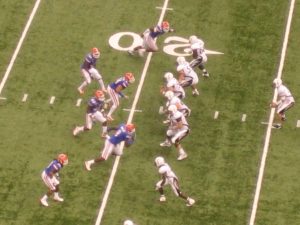 For over a year now, I've been living well without cable or broadcast television in my life. I thought I would share some thoughts on how that transition has gone, and some pointers to tools and technologies you might be interested in if you're on a similar path.
For over a year now, I've been living well without cable or broadcast television in my life. I thought I would share some thoughts on how that transition has gone, and some pointers to tools and technologies you might be interested in if you're on a similar path.
(Disclaimer: I'm not here to tell you how to live, but my general sense is that the world would be a better place if people didn't spend their time watching television. Period. That said, and the reality of TV watching as a cultural norm firmly in place for now, I continue with my narrative.)
The end of channel surfing
The first stage in my transition away from "watching TV" was to get free of the notion that my schedule should ever revolve around the schedule of TV broadcasters.
It's a shame to think about how much of my childhood scheduling might have revolved around wanting to be home at a certain time to watch a certain show, and what other opportunities I might have missed as a part of that. That's where the Tivo DVR that I bought a number of years ago really changed everything - because it records the shows you want to watch for later viewing, I never again had to worry about being proximate to my TV at any particular time. Add in features like fast-forwarding through commercials, having "access" to shows and movies that were on during hours of the day I never would have watched before, and integrating content from the Internet and my computer, and it was quite the little media center.
Yay! I was a little more in control of my TV watching habits, and didn't spend any more time wandering through channels looking for something mediocre to watch.
Tethered to a TV?
Once my TV-watching was controlled by storing content on an Internet-connected device that would let me retrieve it for later viewing, I thought more about why I couldn't watch the content from anywhere I had a screen, instead of having to be in front of the TV itself. The most impressive tool that I found in aiding that un-tethering was the Slingbox, which takes most any audio/video signal and makes it available over the Internet, while also allowing you to remotely control whatever device is playing the signal. In other words, I could watch my TV from anywhere I had network access.
This meant that not only did I not have to be on time to watch content I wanted thanks to Tivo, I didn't have to be anywhere in particular either. While my actual practical uses of this were few, the slight shift in TV watching paradigm was refreshing.
Thank you, Hulu.
A few years ago, to give up cable TV meant giving up the watching of most TV shows altogether, unless you were bumming off of friends and family. But the recent trend is that most kinds of television content is available in some other digital form, whether it's on DVD or on the web for free or available for purchase through an online store like Amazon or iTunes. The emergence of services like Hulu.com, which makes full length episodes of many TV shows available for "free" soon after their broadcast, further drove establishing standards for digital delivery. (I say "free" in quotes because Hulu still shows you advertisements that take up your time and burn into your soul, and neither time nor souls are free.)
So it was about a year ago that I decided that the few shows I still watched on television were either (A) shows I didn't need to watch anymore, or (B) shows that I could find within a reasonable amount of time using other means. I called the cable company and told them so, and haven't looked back since.
 Hello, Roku.
Hello, Roku.
This strange new world of only watching shows over the Internet was working just fine, but I did notice that there was a drop in the convenience factor, as I could no longer sit down in front of the TV, pressing a button and watch something. If I wanted the TV-watching experience, I took the time to hook my computer up to my TV and sound system, and things like pausing to answer the door or switching between content options became a lot more noticeably distracting. (Reality check: yes, watching glowing rectangles is the true distraction.)
A few months later, I saw the announcement of a new $100 device called the Roku player that would make digital content as easy to browse and view as "regular TV" had once been. By linking it with a Netflix account at the lowest price level ($9/month with 1 physical DVD at a time) or paying per-use for Amazon.com selections, I had access to a significant collection of movies and TV shows available for on-demand viewing, and I was back to navigating all of that with a remote control - no computer hookup needed.
A little bit after that, the folks at Hulu made available the great "Hulu Desktop" application, which basically turned navigating their content into something you could also do with a remote control, and so while there was still some computer hookup needed there, it wasn't as distracting.
Am I there yet?
That's where I'm at right now. I can sit down with a remote control and have a real "TV Watching Experience." I have a wide variety of interesting (some of it is even, dare I say, socially redeeming) content available to me on demand, and I don't miss cable or broadcast TV at all. I go to the movie theater a lot less because I have (IMHO) an equivalent or better experience with my own technical setup.
I can't make any claims around living a life free of the distractions and time-wasting activities that cable TV brought with it - I spend plenty of time staring at glowing screens, I still watch shows produced for TV, I'm still bombarded with messages not of my choosing, and I'm still subject to information overload. But I've got a lot more control over how and when I experience that information than I ever did when I subscribed to cable.
While watching this content (especially documentaries) is something I enjoy greatly, I hope to continue to reduce the amount of time I spend in front of a TV for any reason, trading it for time spent experiencing the world in other, less passive ways.
If you have experiences with making changes in how you "experience television," (whether you own one or not), I'd love to hear about them in the comments.
 I’m a journalist, publisher, software developer and entrepreneur with experience as a founder and organizational leader. Work with me or learn more about me.
I’m a journalist, publisher, software developer and entrepreneur with experience as a founder and organizational leader. Work with me or learn more about me.

Interesting commentary! We are considering pulling the plug on satellite TV. We have a Netflix account, and with that a BlueRay disc that plays on the Playstation to stream Netflix content. We have been quite pleased with it other than occasional glitches downloading content. We're disappointed that after 12 yrs. of service, our old receiver broke but DirectTV refuses to offer us the same new receiver deal they offer new customers, so we're probably going to be "former" customers after football season is over.
I gave up regular network tv viewing a couple years ago -- there were only a couple shows I was genuinely interested in watching but they were always at times when I was unable to watch live TV, for one reason or another (generally sullivan-related ;))
I found websites like alluc.org, surfthechannel.com, and occasionally plain ol' bit torrent to get access to shows the day after they aired. Some shows, like South Park or the Daily Show, aired their shows on their own websites, which was nice.
Like you, though, I'm a Hulu'r and Netflix'r. We officially cancelled our comcast service (ALL of it...switched over to Parallax! Go local hosting!). This was a particularly sweet victory for me, since I really dislike them as a company (due to their stance on net neutrality) and really don't want to give them ANY money.
There are a handful of shows I keep up with -- I can watch most of them on Hulu, 1 of them on CBS.com, Southpark, and then 2 of them I have to watch the old fashioned way (Surfthechannel.com). It's been very liberating.
Hulu's commercial airing doesn't bother me in the slightest -- having to watch 3 minutes of commercials for a 30 minute program seems like a very fair trade to me; and if that means the content remains free to watch, so be it. 🙂
I have yet to get a roku, but I did just wire my TV to my laptop last night to watch netflix -- worked great!
lets see...it has been ~13 years since we've had any sort of tv in our house: no commercial tv, cable or satellite. this shift was made when our first daughter was born -- the decision was made because we didn't want our kids marketed to (the little creatures really don't stand a chance against armies of professionals whose goals are to dictate desires). over all I think it has been a good choice for our family. the wife misses watching winter Olympics.... i have to say i miss the ritual of watching college football bowl games (though i never watch football any other time of the year). i'm too $cheap$ to pay for cable or satellite and am on the wrong side of the threshold to invest $ or energy into figuring out how to watch TV on-line. we do have a dvd player and do watch movies from the library -- or what we buy from 1/2 price books.... i don't know -- personally i'm not happy with myself for being passive and sedentary in my relationship with the medium...but it is mostly a winter relationship...(when biology says i should be dormant or hibernating anyway....) movies have taken me to places and shown me things i would never have been able to see or experience otherwise so i can't condemn it completely....
Thanks for this post, Chris. I would love to cut the connection between myself and the cable company - both the media-related one and the financial one! Especially since I feel like I consume a relatively small amount of content for the $30/month I'm paying to Comcast (and my feelings about their company mirror Aaron's.)
I recently decided to purchase a refurbished Apple TV for $150, which I immediately hacked to run XBMC and Boxee, two programs intended to help release me from the grip of cable tv. While XBMC is focused mainly on music and video that is stored locally (thus procured by means such as DVD ripping, torrent downloading, etc.) Boxee focuses on aggregating streaming media content available online through sites like Hulu, YouTube, Joost, and network sites like CBS and ABC.
Though Boxee is still a little rough around the edges, it works amazingly well for a free program. It is available as a free download for nearly every platform (Win/Mac/Linux/AppleTV) and later this spring they are going to start distributing their own "Boxee Box" through D-link that promises to make the experience even better.
I think anyone interested in this kind of effort should definitely give Boxee a try!